Comprehensive Report on Referencing, Plagiarism, and Research Skills
VerifiedAdded on 2020/12/10
|8
|2227
|98
Report
AI Summary
This report delves into crucial aspects of academic research, emphasizing referencing, plagiarism, and effective research skills. It highlights the significance of proper citation, avoiding plagiarism through paraphrasing and quoting, and the ethical and legal consequences of plagiarism. The report outlines a framework for academic writing, including developing a first draft, planning, clarifying tasks, and evaluating progress. It emphasizes the importance of reviewing literature, enhancing presentation skills, and conducting research in teams, while also providing a skills checklist for self-assessment. The report underscores the importance of understanding research methodologies, including framing objectives, gathering data, and analyzing results, to ensure the validity and reliability of research findings. It also discusses the practical application of research, such as creating e-portfolios, and provides actionable strategies for students to improve their research skills and avoid plagiarism.

Portfolio
Paraphrase This Document
Need a fresh take? Get an instant paraphrase of this document with our AI Paraphraser

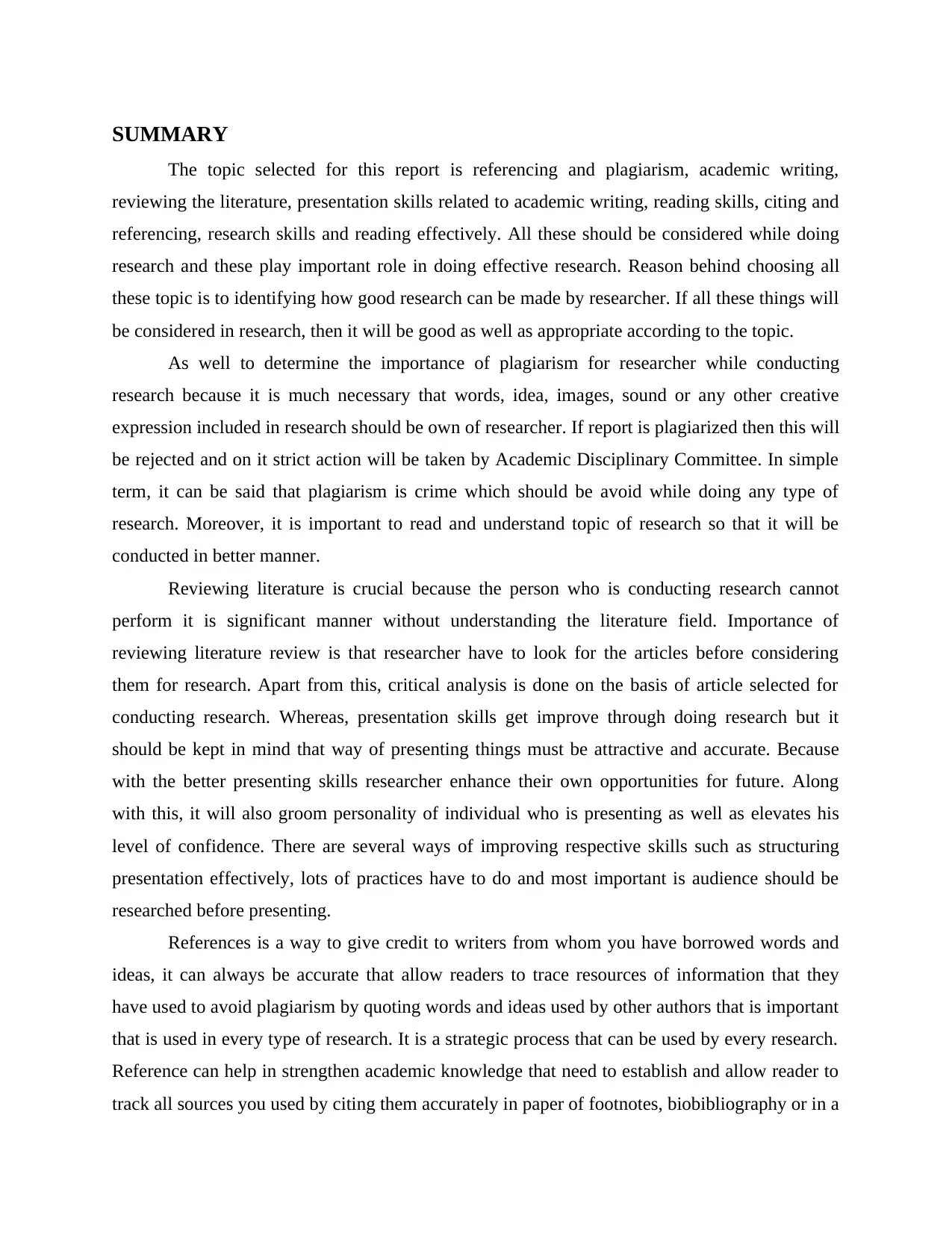
SUMMARY
The topic selected for this report is referencing and plagiarism, academic writing,
reviewing the literature, presentation skills related to academic writing, reading skills, citing and
referencing, research skills and reading effectively. All these should be considered while doing
research and these play important role in doing effective research. Reason behind choosing all
these topic is to identifying how good research can be made by researcher. If all these things will
be considered in research, then it will be good as well as appropriate according to the topic.
As well to determine the importance of plagiarism for researcher while conducting
research because it is much necessary that words, idea, images, sound or any other creative
expression included in research should be own of researcher. If report is plagiarized then this will
be rejected and on it strict action will be taken by Academic Disciplinary Committee. In simple
term, it can be said that plagiarism is crime which should be avoid while doing any type of
research. Moreover, it is important to read and understand topic of research so that it will be
conducted in better manner.
Reviewing literature is crucial because the person who is conducting research cannot
perform it is significant manner without understanding the literature field. Importance of
reviewing literature review is that researcher have to look for the articles before considering
them for research. Apart from this, critical analysis is done on the basis of article selected for
conducting research. Whereas, presentation skills get improve through doing research but it
should be kept in mind that way of presenting things must be attractive and accurate. Because
with the better presenting skills researcher enhance their own opportunities for future. Along
with this, it will also groom personality of individual who is presenting as well as elevates his
level of confidence. There are several ways of improving respective skills such as structuring
presentation effectively, lots of practices have to do and most important is audience should be
researched before presenting.
References is a way to give credit to writers from whom you have borrowed words and
ideas, it can always be accurate that allow readers to trace resources of information that they
have used to avoid plagiarism by quoting words and ideas used by other authors that is important
that is used in every type of research. It is a strategic process that can be used by every research.
Reference can help in strengthen academic knowledge that need to establish and allow reader to
track all sources you used by citing them accurately in paper of footnotes, biobibliography or in a
The topic selected for this report is referencing and plagiarism, academic writing,
reviewing the literature, presentation skills related to academic writing, reading skills, citing and
referencing, research skills and reading effectively. All these should be considered while doing
research and these play important role in doing effective research. Reason behind choosing all
these topic is to identifying how good research can be made by researcher. If all these things will
be considered in research, then it will be good as well as appropriate according to the topic.
As well to determine the importance of plagiarism for researcher while conducting
research because it is much necessary that words, idea, images, sound or any other creative
expression included in research should be own of researcher. If report is plagiarized then this will
be rejected and on it strict action will be taken by Academic Disciplinary Committee. In simple
term, it can be said that plagiarism is crime which should be avoid while doing any type of
research. Moreover, it is important to read and understand topic of research so that it will be
conducted in better manner.
Reviewing literature is crucial because the person who is conducting research cannot
perform it is significant manner without understanding the literature field. Importance of
reviewing literature review is that researcher have to look for the articles before considering
them for research. Apart from this, critical analysis is done on the basis of article selected for
conducting research. Whereas, presentation skills get improve through doing research but it
should be kept in mind that way of presenting things must be attractive and accurate. Because
with the better presenting skills researcher enhance their own opportunities for future. Along
with this, it will also groom personality of individual who is presenting as well as elevates his
level of confidence. There are several ways of improving respective skills such as structuring
presentation effectively, lots of practices have to do and most important is audience should be
researched before presenting.
References is a way to give credit to writers from whom you have borrowed words and
ideas, it can always be accurate that allow readers to trace resources of information that they
have used to avoid plagiarism by quoting words and ideas used by other authors that is important
that is used in every type of research. It is a strategic process that can be used by every research.
Reference can help in strengthen academic knowledge that need to establish and allow reader to
track all sources you used by citing them accurately in paper of footnotes, biobibliography or in a
⊘ This is a preview!⊘
Do you want full access?
Subscribe today to unlock all pages.

Trusted by 1+ million students worldwide
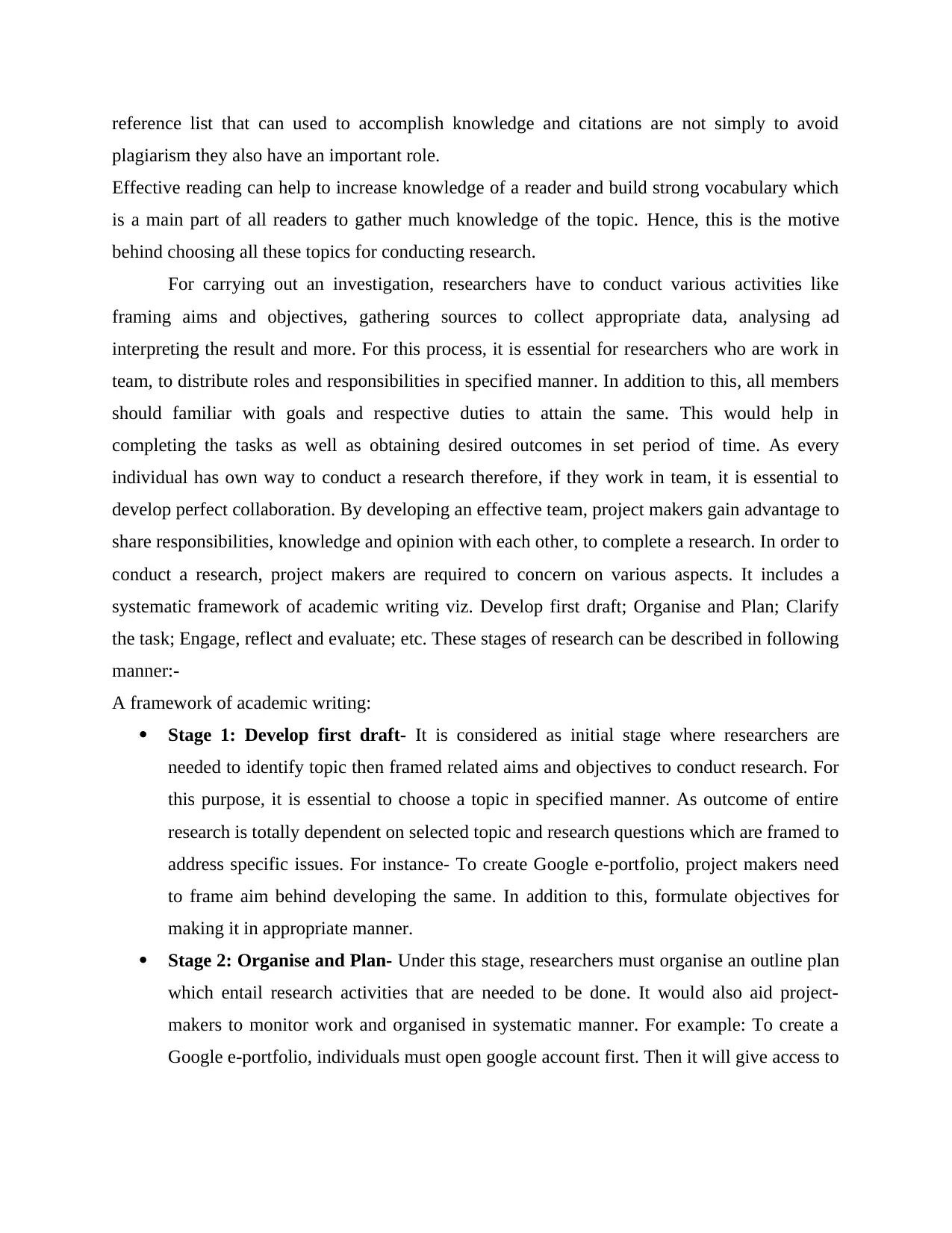
reference list that can used to accomplish knowledge and citations are not simply to avoid
plagiarism they also have an important role.
Effective reading can help to increase knowledge of a reader and build strong vocabulary which
is a main part of all readers to gather much knowledge of the topic. Hence, this is the motive
behind choosing all these topics for conducting research.
For carrying out an investigation, researchers have to conduct various activities like
framing aims and objectives, gathering sources to collect appropriate data, analysing ad
interpreting the result and more. For this process, it is essential for researchers who are work in
team, to distribute roles and responsibilities in specified manner. In addition to this, all members
should familiar with goals and respective duties to attain the same. This would help in
completing the tasks as well as obtaining desired outcomes in set period of time. As every
individual has own way to conduct a research therefore, if they work in team, it is essential to
develop perfect collaboration. By developing an effective team, project makers gain advantage to
share responsibilities, knowledge and opinion with each other, to complete a research. In order to
conduct a research, project makers are required to concern on various aspects. It includes a
systematic framework of academic writing viz. Develop first draft; Organise and Plan; Clarify
the task; Engage, reflect and evaluate; etc. These stages of research can be described in following
manner:-
A framework of academic writing:
Stage 1: Develop first draft- It is considered as initial stage where researchers are
needed to identify topic then framed related aims and objectives to conduct research. For
this purpose, it is essential to choose a topic in specified manner. As outcome of entire
research is totally dependent on selected topic and research questions which are framed to
address specific issues. For instance- To create Google e-portfolio, project makers need
to frame aim behind developing the same. In addition to this, formulate objectives for
making it in appropriate manner.
Stage 2: Organise and Plan- Under this stage, researchers must organise an outline plan
which entail research activities that are needed to be done. It would also aid project-
makers to monitor work and organised in systematic manner. For example: To create a
Google e-portfolio, individuals must open google account first. Then it will give access to
plagiarism they also have an important role.
Effective reading can help to increase knowledge of a reader and build strong vocabulary which
is a main part of all readers to gather much knowledge of the topic. Hence, this is the motive
behind choosing all these topics for conducting research.
For carrying out an investigation, researchers have to conduct various activities like
framing aims and objectives, gathering sources to collect appropriate data, analysing ad
interpreting the result and more. For this process, it is essential for researchers who are work in
team, to distribute roles and responsibilities in specified manner. In addition to this, all members
should familiar with goals and respective duties to attain the same. This would help in
completing the tasks as well as obtaining desired outcomes in set period of time. As every
individual has own way to conduct a research therefore, if they work in team, it is essential to
develop perfect collaboration. By developing an effective team, project makers gain advantage to
share responsibilities, knowledge and opinion with each other, to complete a research. In order to
conduct a research, project makers are required to concern on various aspects. It includes a
systematic framework of academic writing viz. Develop first draft; Organise and Plan; Clarify
the task; Engage, reflect and evaluate; etc. These stages of research can be described in following
manner:-
A framework of academic writing:
Stage 1: Develop first draft- It is considered as initial stage where researchers are
needed to identify topic then framed related aims and objectives to conduct research. For
this purpose, it is essential to choose a topic in specified manner. As outcome of entire
research is totally dependent on selected topic and research questions which are framed to
address specific issues. For instance- To create Google e-portfolio, project makers need
to frame aim behind developing the same. In addition to this, formulate objectives for
making it in appropriate manner.
Stage 2: Organise and Plan- Under this stage, researchers must organise an outline plan
which entail research activities that are needed to be done. It would also aid project-
makers to monitor work and organised in systematic manner. For example: To create a
Google e-portfolio, individuals must open google account first. Then it will give access to
Paraphrase This Document
Need a fresh take? Get an instant paraphrase of this document with our AI Paraphraser
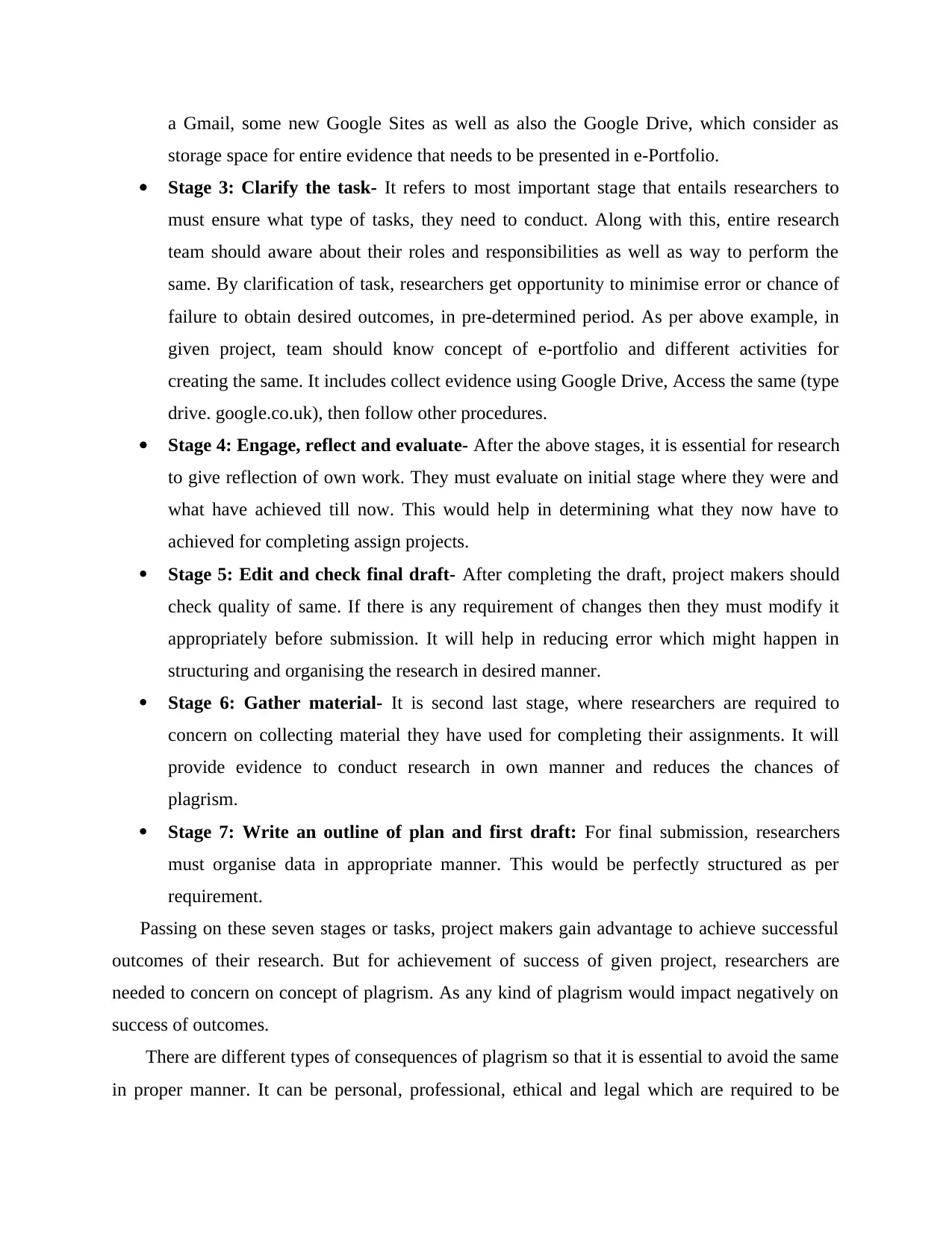
a Gmail, some new Google Sites as well as also the Google Drive, which consider as
storage space for entire evidence that needs to be presented in e-Portfolio.
Stage 3: Clarify the task- It refers to most important stage that entails researchers to
must ensure what type of tasks, they need to conduct. Along with this, entire research
team should aware about their roles and responsibilities as well as way to perform the
same. By clarification of task, researchers get opportunity to minimise error or chance of
failure to obtain desired outcomes, in pre-determined period. As per above example, in
given project, team should know concept of e-portfolio and different activities for
creating the same. It includes collect evidence using Google Drive, Access the same (type
drive. google.co.uk), then follow other procedures.
Stage 4: Engage, reflect and evaluate- After the above stages, it is essential for research
to give reflection of own work. They must evaluate on initial stage where they were and
what have achieved till now. This would help in determining what they now have to
achieved for completing assign projects.
Stage 5: Edit and check final draft- After completing the draft, project makers should
check quality of same. If there is any requirement of changes then they must modify it
appropriately before submission. It will help in reducing error which might happen in
structuring and organising the research in desired manner.
Stage 6: Gather material- It is second last stage, where researchers are required to
concern on collecting material they have used for completing their assignments. It will
provide evidence to conduct research in own manner and reduces the chances of
plagrism.
Stage 7: Write an outline of plan and first draft: For final submission, researchers
must organise data in appropriate manner. This would be perfectly structured as per
requirement.
Passing on these seven stages or tasks, project makers gain advantage to achieve successful
outcomes of their research. But for achievement of success of given project, researchers are
needed to concern on concept of plagrism. As any kind of plagrism would impact negatively on
success of outcomes.
There are different types of consequences of plagrism so that it is essential to avoid the same
in proper manner. It can be personal, professional, ethical and legal which are required to be
storage space for entire evidence that needs to be presented in e-Portfolio.
Stage 3: Clarify the task- It refers to most important stage that entails researchers to
must ensure what type of tasks, they need to conduct. Along with this, entire research
team should aware about their roles and responsibilities as well as way to perform the
same. By clarification of task, researchers get opportunity to minimise error or chance of
failure to obtain desired outcomes, in pre-determined period. As per above example, in
given project, team should know concept of e-portfolio and different activities for
creating the same. It includes collect evidence using Google Drive, Access the same (type
drive. google.co.uk), then follow other procedures.
Stage 4: Engage, reflect and evaluate- After the above stages, it is essential for research
to give reflection of own work. They must evaluate on initial stage where they were and
what have achieved till now. This would help in determining what they now have to
achieved for completing assign projects.
Stage 5: Edit and check final draft- After completing the draft, project makers should
check quality of same. If there is any requirement of changes then they must modify it
appropriately before submission. It will help in reducing error which might happen in
structuring and organising the research in desired manner.
Stage 6: Gather material- It is second last stage, where researchers are required to
concern on collecting material they have used for completing their assignments. It will
provide evidence to conduct research in own manner and reduces the chances of
plagrism.
Stage 7: Write an outline of plan and first draft: For final submission, researchers
must organise data in appropriate manner. This would be perfectly structured as per
requirement.
Passing on these seven stages or tasks, project makers gain advantage to achieve successful
outcomes of their research. But for achievement of success of given project, researchers are
needed to concern on concept of plagrism. As any kind of plagrism would impact negatively on
success of outcomes.
There are different types of consequences of plagrism so that it is essential to avoid the same
in proper manner. It can be personal, professional, ethical and legal which are required to be
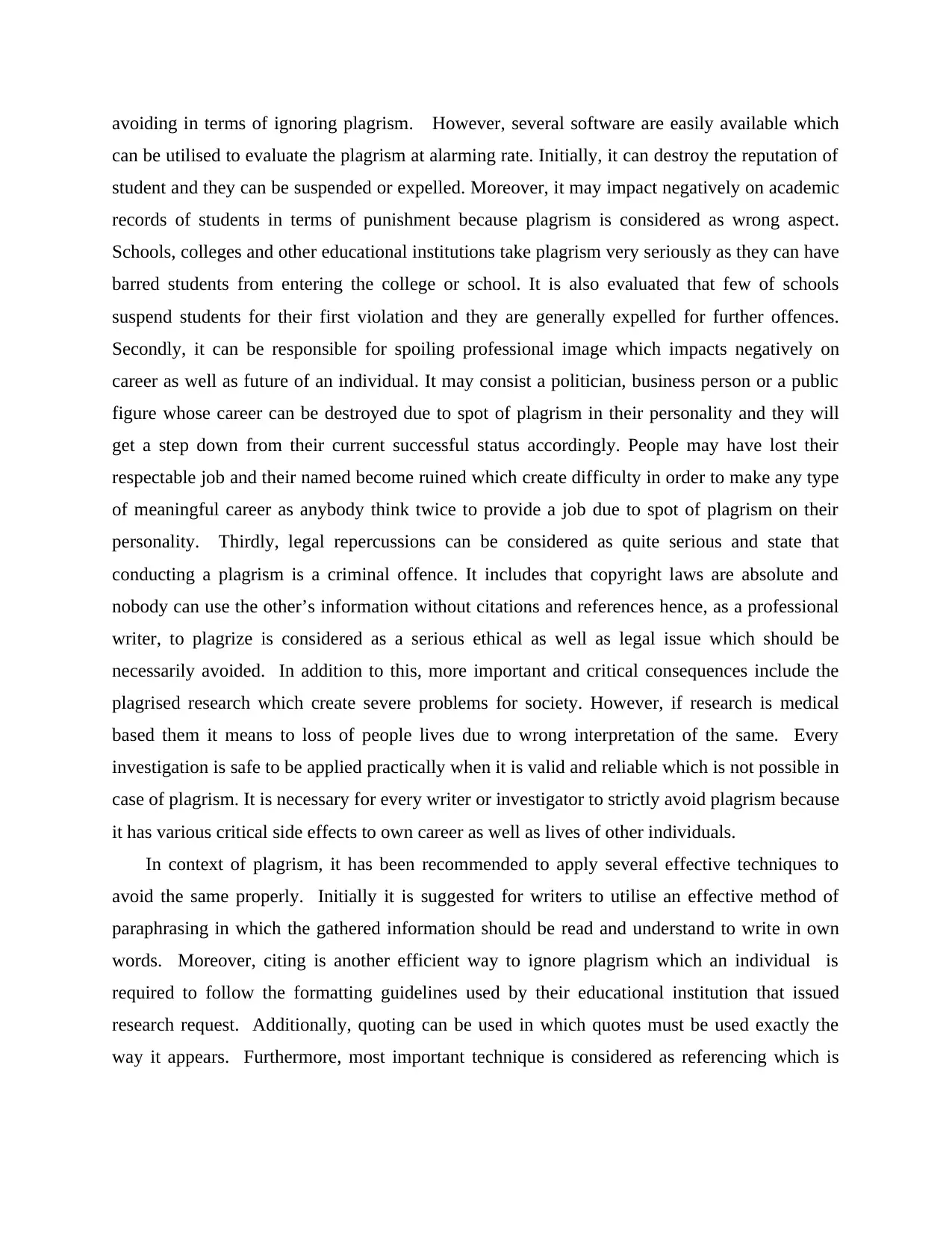
avoiding in terms of ignoring plagrism. However, several software are easily available which
can be utilised to evaluate the plagrism at alarming rate. Initially, it can destroy the reputation of
student and they can be suspended or expelled. Moreover, it may impact negatively on academic
records of students in terms of punishment because plagrism is considered as wrong aspect.
Schools, colleges and other educational institutions take plagrism very seriously as they can have
barred students from entering the college or school. It is also evaluated that few of schools
suspend students for their first violation and they are generally expelled for further offences.
Secondly, it can be responsible for spoiling professional image which impacts negatively on
career as well as future of an individual. It may consist a politician, business person or a public
figure whose career can be destroyed due to spot of plagrism in their personality and they will
get a step down from their current successful status accordingly. People may have lost their
respectable job and their named become ruined which create difficulty in order to make any type
of meaningful career as anybody think twice to provide a job due to spot of plagrism on their
personality. Thirdly, legal repercussions can be considered as quite serious and state that
conducting a plagrism is a criminal offence. It includes that copyright laws are absolute and
nobody can use the other’s information without citations and references hence, as a professional
writer, to plagrize is considered as a serious ethical as well as legal issue which should be
necessarily avoided. In addition to this, more important and critical consequences include the
plagrised research which create severe problems for society. However, if research is medical
based them it means to loss of people lives due to wrong interpretation of the same. Every
investigation is safe to be applied practically when it is valid and reliable which is not possible in
case of plagrism. It is necessary for every writer or investigator to strictly avoid plagrism because
it has various critical side effects to own career as well as lives of other individuals.
In context of plagrism, it has been recommended to apply several effective techniques to
avoid the same properly. Initially it is suggested for writers to utilise an effective method of
paraphrasing in which the gathered information should be read and understand to write in own
words. Moreover, citing is another efficient way to ignore plagrism which an individual is
required to follow the formatting guidelines used by their educational institution that issued
research request. Additionally, quoting can be used in which quotes must be used exactly the
way it appears. Furthermore, most important technique is considered as referencing which is
can be utilised to evaluate the plagrism at alarming rate. Initially, it can destroy the reputation of
student and they can be suspended or expelled. Moreover, it may impact negatively on academic
records of students in terms of punishment because plagrism is considered as wrong aspect.
Schools, colleges and other educational institutions take plagrism very seriously as they can have
barred students from entering the college or school. It is also evaluated that few of schools
suspend students for their first violation and they are generally expelled for further offences.
Secondly, it can be responsible for spoiling professional image which impacts negatively on
career as well as future of an individual. It may consist a politician, business person or a public
figure whose career can be destroyed due to spot of plagrism in their personality and they will
get a step down from their current successful status accordingly. People may have lost their
respectable job and their named become ruined which create difficulty in order to make any type
of meaningful career as anybody think twice to provide a job due to spot of plagrism on their
personality. Thirdly, legal repercussions can be considered as quite serious and state that
conducting a plagrism is a criminal offence. It includes that copyright laws are absolute and
nobody can use the other’s information without citations and references hence, as a professional
writer, to plagrize is considered as a serious ethical as well as legal issue which should be
necessarily avoided. In addition to this, more important and critical consequences include the
plagrised research which create severe problems for society. However, if research is medical
based them it means to loss of people lives due to wrong interpretation of the same. Every
investigation is safe to be applied practically when it is valid and reliable which is not possible in
case of plagrism. It is necessary for every writer or investigator to strictly avoid plagrism because
it has various critical side effects to own career as well as lives of other individuals.
In context of plagrism, it has been recommended to apply several effective techniques to
avoid the same properly. Initially it is suggested for writers to utilise an effective method of
paraphrasing in which the gathered information should be read and understand to write in own
words. Moreover, citing is another efficient way to ignore plagrism which an individual is
required to follow the formatting guidelines used by their educational institution that issued
research request. Additionally, quoting can be used in which quotes must be used exactly the
way it appears. Furthermore, most important technique is considered as referencing which is
⊘ This is a preview!⊘
Do you want full access?
Subscribe today to unlock all pages.

Trusted by 1+ million students worldwide
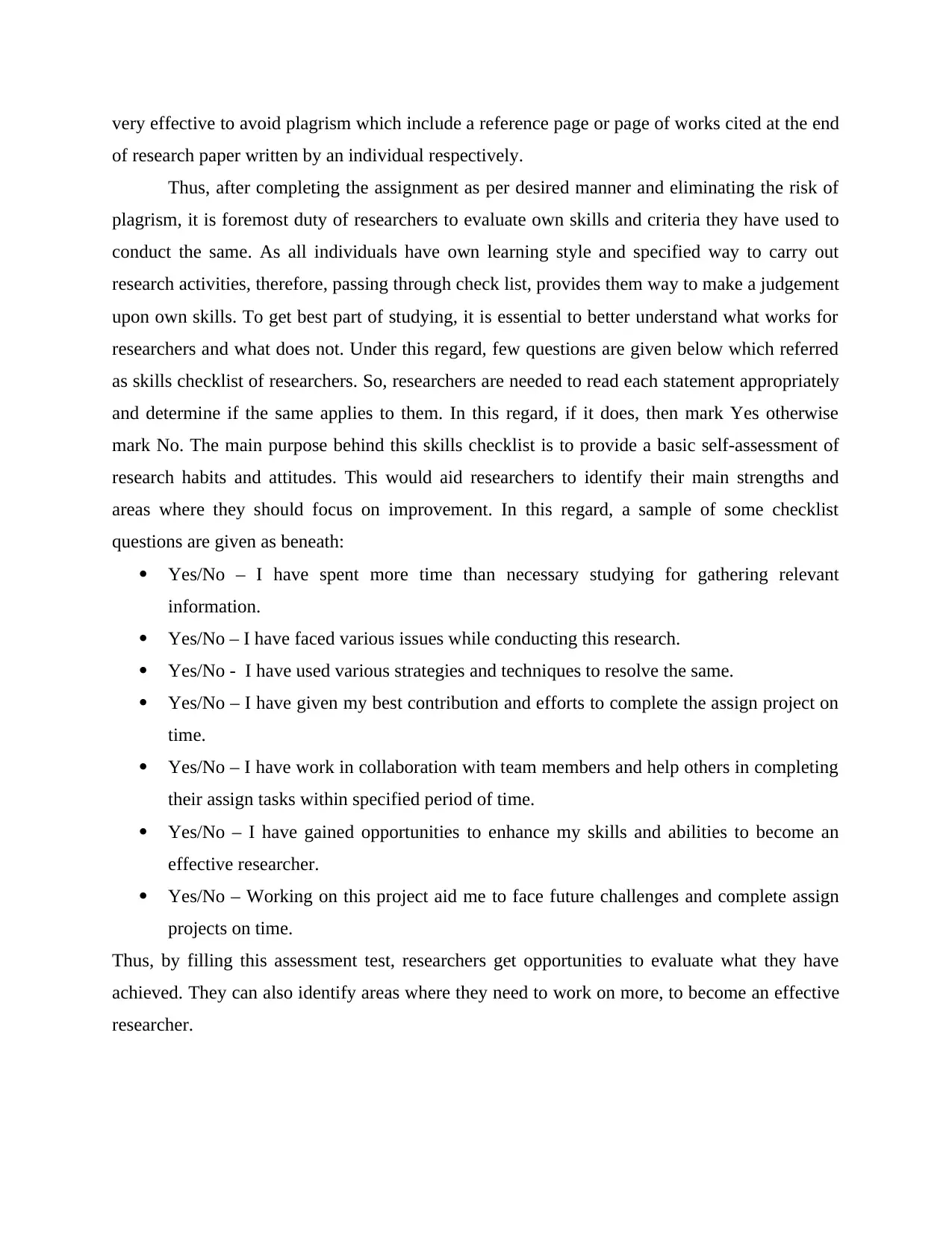
very effective to avoid plagrism which include a reference page or page of works cited at the end
of research paper written by an individual respectively.
Thus, after completing the assignment as per desired manner and eliminating the risk of
plagrism, it is foremost duty of researchers to evaluate own skills and criteria they have used to
conduct the same. As all individuals have own learning style and specified way to carry out
research activities, therefore, passing through check list, provides them way to make a judgement
upon own skills. To get best part of studying, it is essential to better understand what works for
researchers and what does not. Under this regard, few questions are given below which referred
as skills checklist of researchers. So, researchers are needed to read each statement appropriately
and determine if the same applies to them. In this regard, if it does, then mark Yes otherwise
mark No. The main purpose behind this skills checklist is to provide a basic self-assessment of
research habits and attitudes. This would aid researchers to identify their main strengths and
areas where they should focus on improvement. In this regard, a sample of some checklist
questions are given as beneath:
Yes/No – I have spent more time than necessary studying for gathering relevant
information.
Yes/No – I have faced various issues while conducting this research.
Yes/No - I have used various strategies and techniques to resolve the same.
Yes/No – I have given my best contribution and efforts to complete the assign project on
time.
Yes/No – I have work in collaboration with team members and help others in completing
their assign tasks within specified period of time.
Yes/No – I have gained opportunities to enhance my skills and abilities to become an
effective researcher.
Yes/No – Working on this project aid me to face future challenges and complete assign
projects on time.
Thus, by filling this assessment test, researchers get opportunities to evaluate what they have
achieved. They can also identify areas where they need to work on more, to become an effective
researcher.
of research paper written by an individual respectively.
Thus, after completing the assignment as per desired manner and eliminating the risk of
plagrism, it is foremost duty of researchers to evaluate own skills and criteria they have used to
conduct the same. As all individuals have own learning style and specified way to carry out
research activities, therefore, passing through check list, provides them way to make a judgement
upon own skills. To get best part of studying, it is essential to better understand what works for
researchers and what does not. Under this regard, few questions are given below which referred
as skills checklist of researchers. So, researchers are needed to read each statement appropriately
and determine if the same applies to them. In this regard, if it does, then mark Yes otherwise
mark No. The main purpose behind this skills checklist is to provide a basic self-assessment of
research habits and attitudes. This would aid researchers to identify their main strengths and
areas where they should focus on improvement. In this regard, a sample of some checklist
questions are given as beneath:
Yes/No – I have spent more time than necessary studying for gathering relevant
information.
Yes/No – I have faced various issues while conducting this research.
Yes/No - I have used various strategies and techniques to resolve the same.
Yes/No – I have given my best contribution and efforts to complete the assign project on
time.
Yes/No – I have work in collaboration with team members and help others in completing
their assign tasks within specified period of time.
Yes/No – I have gained opportunities to enhance my skills and abilities to become an
effective researcher.
Yes/No – Working on this project aid me to face future challenges and complete assign
projects on time.
Thus, by filling this assessment test, researchers get opportunities to evaluate what they have
achieved. They can also identify areas where they need to work on more, to become an effective
researcher.
Paraphrase This Document
Need a fresh take? Get an instant paraphrase of this document with our AI Paraphraser

1
1 out of 8
Related Documents
Your All-in-One AI-Powered Toolkit for Academic Success.
+13062052269
info@desklib.com
Available 24*7 on WhatsApp / Email
![[object Object]](/_next/static/media/star-bottom.7253800d.svg)
Unlock your academic potential
Copyright © 2020–2026 A2Z Services. All Rights Reserved. Developed and managed by ZUCOL.




